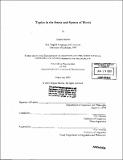Topics in the stress and syntax of words
Author(s)
Marvin, Tatjana, 1972-
DownloadFull printable version (10.59Mb)
Other Contributors
Massachusetts Institute of Technology. Dept. of Linguistics and Philosophy.
Advisor
Alex Marantz.
Terms of use
Metadata
Show full item recordAbstract
This dissertation is a study of word structure showing that words exhibit the syntactic phenomenon of phase-by-phase Spell-Out, Chomsky (2001), Marantz (2001). The analysis of data from English and Slovenian indicates that the syntactic structure in word formation, specifically, the existence of phases at the word level, is necessary to make generalizations about the meaning and stress properties of words in these two languages. This result gives support to a theory of morphology that treats word formation as occurring in the Syntax component, following the same rules for syntactic phrase formation, such as Distributed Morphology, Halle and Marantz (1993), Marantz (1997). In Chapter 1 the basic ideas of Distributed Morphology are laid out. In Chapter 2 the central proposal of this dissertation is presented: category-forming phrases such as little v, n and a constitute Spell-Out domains, i.e. phases, at the word level. The idea is argued for with the example of English syllabification and schwa-insertion, showing that syllabification properties of derived words and the predictability of their meaning do not follow exclusively from diacritic markings on derivational affixes, but are reflexes of both idiosyncratic properties of affixes and of the syntax in which they are found. Chapter 3 deals with the interaction of stress assignment and the syntax of words in English, arguing that stress and vowel quality in English can be diagnostic of Spell-Out domains within words and that in turn syntactic domains predict the Spell-Out. Chapter 4 is an analysis of Slovenian participial nominalizations. It is first shown that these nominalizations are truly examples of nominalizing heads attaching to participial forms. (cont.) And second, it is argued that their Spell-Out proceeds in phases defined by category-forming heads with the cyclic Spell-Out reflected in their stress pattern. Chapter 5 is a study of the stress patterns in Slovenian verbal environments and the interaction of stress and structure in these environments. The stress patterns are captured by positing two types of stress retraction rules - the phonological ones and those referring to the syntactic structure.
Description
Thesis (Ph. D.)--Massachusetts Institute of Technology, Dept. of Linguistics and Philosophy, February 2003. Includes bibliographical references (p. 169-174).
Date issued
2003Department
Massachusetts Institute of Technology. Department of Linguistics and PhilosophyPublisher
Massachusetts Institute of Technology
Keywords
Linguistics and Philosophy.